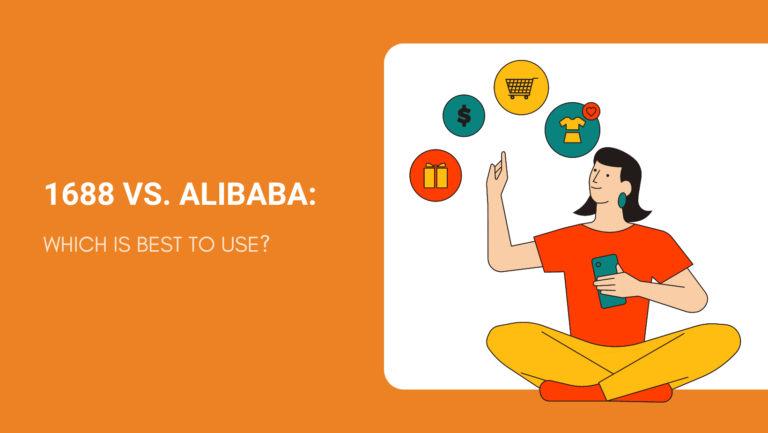Have you ever wondered about the difference between 1688 and Alibaba? These two e-commerce giants, both owned by the Alibaba Group, serve distinct markets and offer unique advantages to buyers and sellers.
1688 is primarily focused on the Chinese domestic market, offering lower prices and direct access to suppliers, while Alibaba caters to international buyers with a more user-friendly interface and English language support.
As an e-commerce entrepreneur or business owner, understanding the nuances between these platforms can significantly impact your sourcing strategy and profit margins.
Whether you’re looking to tap into China’s vast manufacturing capabilities or expand your global reach, choosing the right platform is crucial for success.
Key Takeaways
- 1688 offers lower prices and direct supplier access for the Chinese market.
- Alibaba provides a more international-friendly experience with English support.
- Both platforms have unique features catering to different business needs.
Overview of 1688
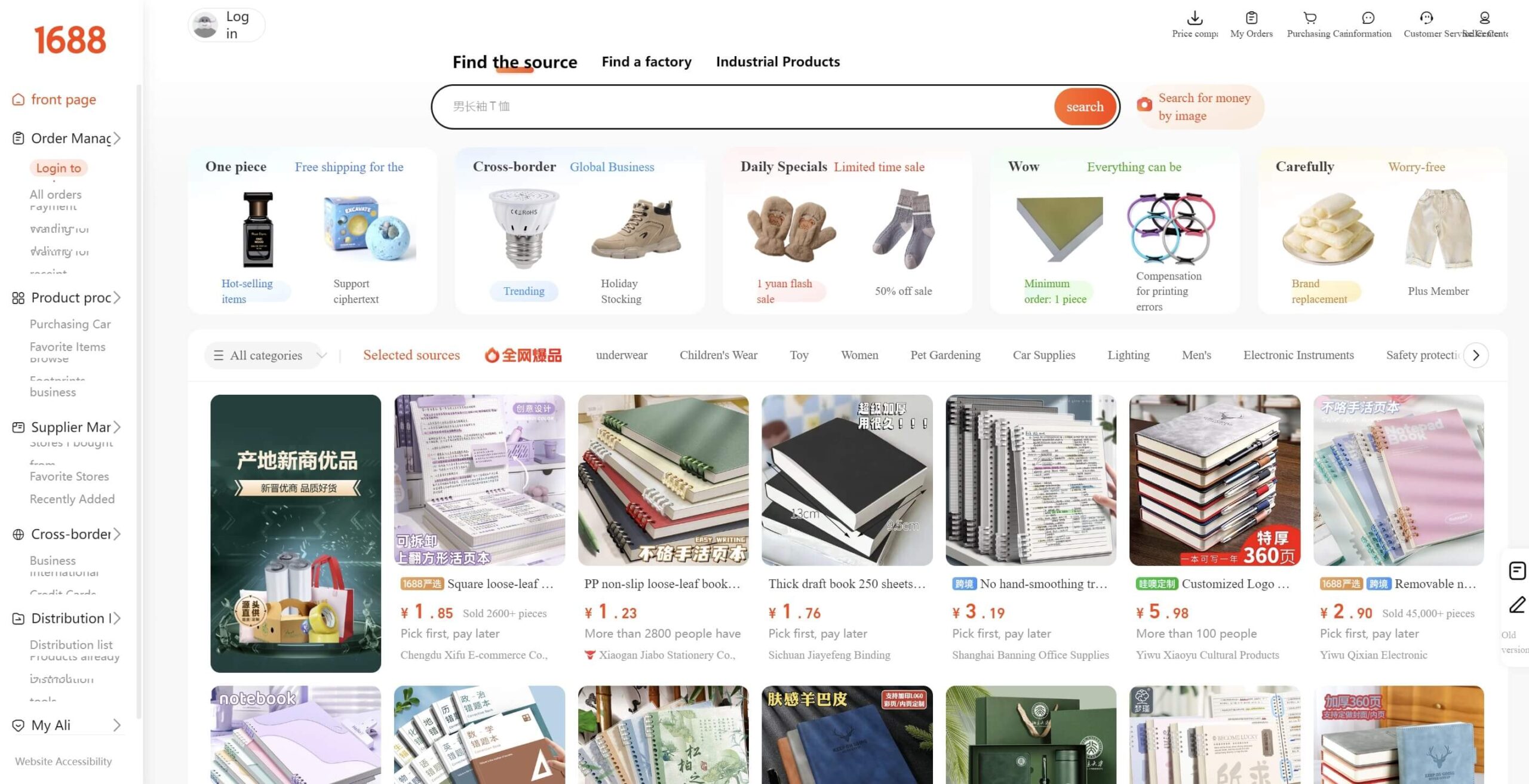
1688, pronounced “yao liu ba ba” in Chinese, is a powerful B2B e-commerce platform primarily serving the Chinese domestic market. Launched in 1999 alongside its international counterpart Alibaba, 1688 is a subsidiary of the Alibaba Group.
1688 focuses on connecting Chinese manufacturers, wholesalers, and suppliers with local buyers. The platform’s name cleverly combines the lucky numbers 6 and 8 in Chinese culture, symbolizing smooth business and prosperity.
1688 offers a vast array of products across various categories, including:
- Clothing and textiles
- Electronics
- Home and garden
- Beauty and personal care
- Industrial equipment
As a buyer, you can benefit from 1688’s competitive pricing and direct access to Chinese factories. The platform boasts over 10 million active sellers and handles billions of dollars in transactions annually.
One unique feature of 1688 is its focus on small to medium-sized orders, making it ideal for local retailers and small businesses in China. This contrasts with Alibaba’s emphasis on larger, international orders.
Keep in mind that 1688’s interface is primarily in Chinese, which can be challenging for non-Chinese speakers. However, if you’re looking to tap into the Chinese market or find lower prices, 1688 can be a valuable resource.
Pros of 1688
What makes 1688 one of the most preferred online shopping sites in China? Let’s explore its pros:
Product Variety
You can potentially find more variety on 1688 than you would on Alibaba. That’s because only a small number of sellers in China are registered on Alibaba.
They don’t use Alibaba mainly because they don’t need to. The mainland is more than enough to keep their business afloat. Aside from that, they also lack English-speaking staff.
So considering the number of local sellers in 1688, it isn’t surprising why it offers more variety than Alibaba.
Reasonable Pricing
1688 has some of the cheapest goods you’ll find in China. Without a doubt, it offers better prices than Alibaba.
The reason for that is Alibaba targets the foreign market. So there are also additional expenses being covered like shipping costs, and other overheads.
But 1688 offers local Chinese prices as it targets the domestic market.
Pricing Transparency
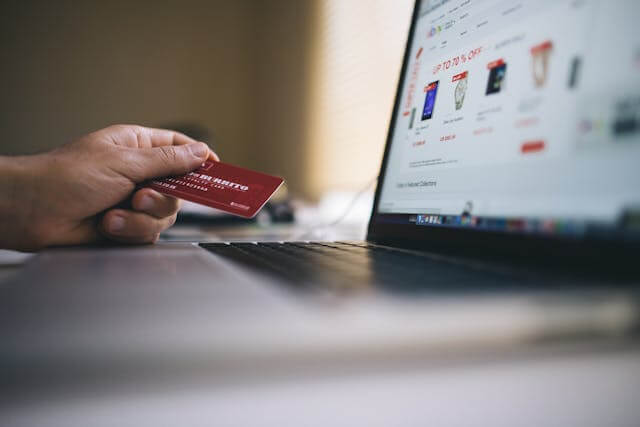
As we mentioned, the sellers on Alibaba often lack transparency in terms of pricing. Their price would usually be a placeholder and when you message them they would often quote higher.
But in the case of 1688, this isn’t the case. Most stores list accurate pricing. And it wouldn’t be an overstatement to say that it offers a buying experience similar to Amazon.
You can even get a refund if your order isn’t delivered during the given timeframe.
Customer Service and App
Ironically, 1688 has a far superior mobile app than its international counterpart. Aside from that, the customer service is also quick to respond.
Perhaps one of the reasons for its quick customer service is that labor is cheap in China. So overall, if you do face a problem with your order, you can expect a quick resolution.
Cons of 1688
1688 may look good on the surface, but it also comes with a decent number of drawbacks. So let’s shed some light on its cons:
No English Support
Language barriers are one of the biggest issues while ordering from 1688. Chinese is the only language the site supports.
You could install the auto-translate plugin on your web browser, but those translations are often inaccurate.
So you might not be able to understand crucial information about a product while placing an order.
Quality Issues
Cheaper isn’t always better. As we mentioned, the majority of the products on Amazon are sourced from Alibaba. So some sellers always try to maintain strict quality standards.
However, 1688 targets the local Chinese market, so in terms of quality, its products are often a hit or miss.
You can either find a high-quality product or a complete knock-off of what you were expecting.
Export Problems
1688 primarily targets the domestic market, so finding suppliers there to export goods can be a challenge. Most of them don’t have an export license.
Although it’s possible to work around this problem, it can take additional time. And if your MOQ is low, then sellers may even refuse it.
Supplier Experience
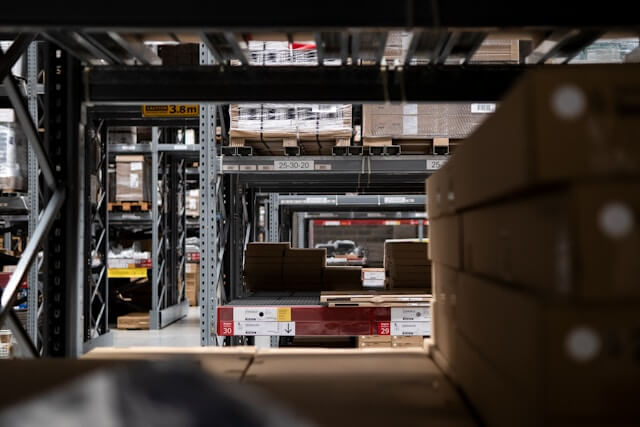
The suppliers in 1688 lack foreign experience. So they don’t know the formalities that may come with foreign transactions and international contracts.
Additionally, language barriers are also a major obstacle as most of them can’t speak or understand English.
How to Buy from 1688?
Buying from 1688 can be a bit tricky if you don’t speak Chinese, but don’t worry! Here’s a step-by-step guide to help you navigate this popular Chinese wholesale marketplace.
- Set up an account:
- Visit 1688.com
- Click on “Register” in the top right corner
- Use Google Translate to help with registration forms
- Search for products:
- Use the search bar at the top of the page
- Try searching in Chinese for better results (use translation tools)
- Communicate with suppliers:
- Use the built-in chat feature
- Employ translation services like Google Translate
- Place your order:
- Add items to your cart
- Review your order carefully
- Choose your shipping method
- Arrange payment:
- Set up Alipay (1688’s preferred payment method)
- Link your credit card or bank account
To make your 1688 buying experience smoother, consider using translation browser extensions or hiring a sourcing agent familiar with the platform.
Overview of Alibaba
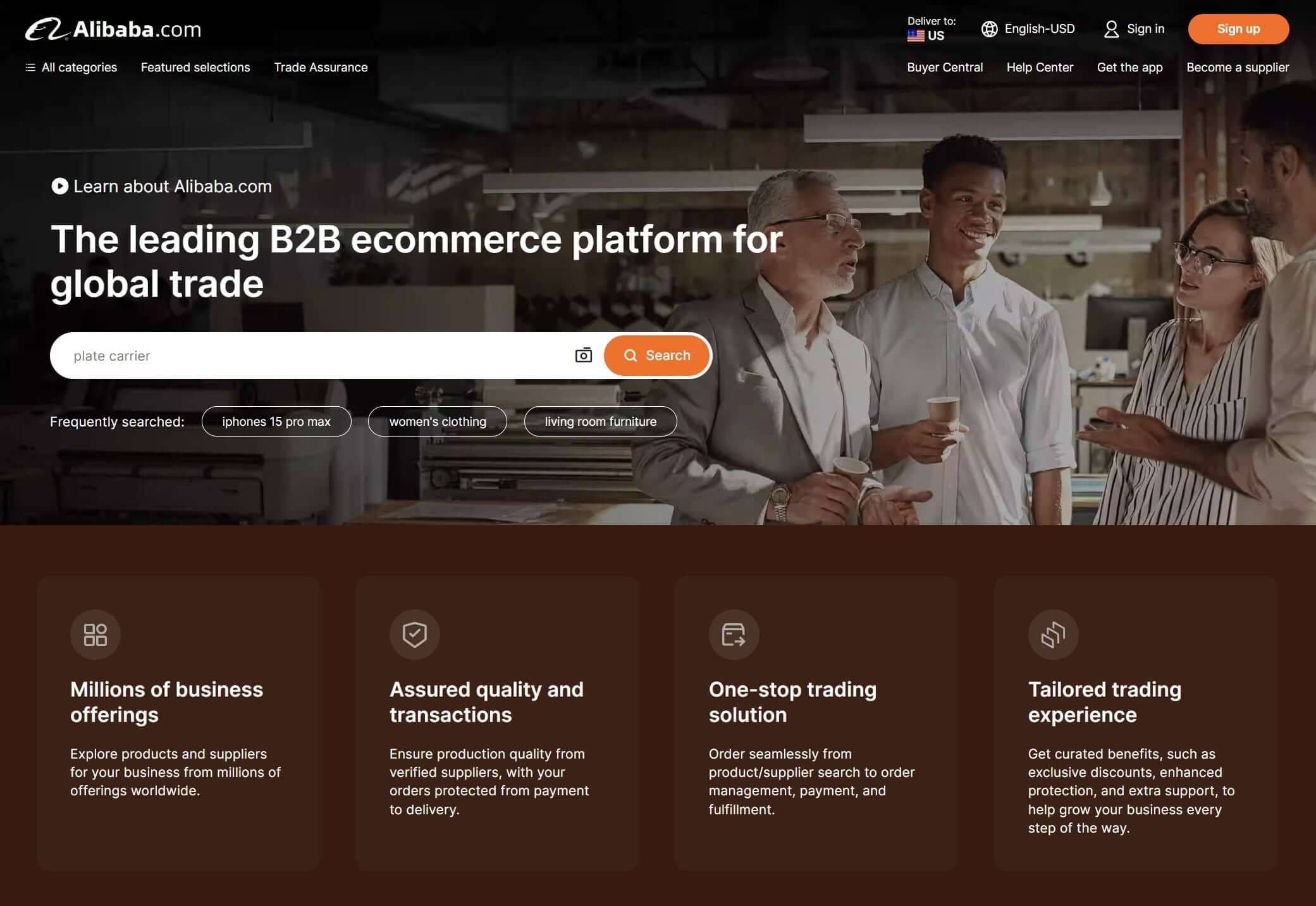
Alibaba.com is a global wholesale platform that connects buyers and sellers worldwide. Founded in 1999, it has become one of the largest e-commerce companies globally.
You’ll find Alibaba caters primarily to international buyers seeking products from Chinese manufacturers and suppliers. The platform supports multiple languages and currencies, making it accessible to users from over 190 countries and regions.
Alibaba offers a wide range of products across various categories, including:
- Electronics
- Apparel
- Home & Garden
- Beauty & Personal Care
- Machinery
One of Alibaba’s key features is its Trade Assurance program, which protects buyers’ orders from quality issues and shipping delays. This gives you added peace of mind when sourcing from unfamiliar suppliers.
The platform also provides tools like instant messaging and video conferencing to facilitate communication between buyers and sellers. You can easily request quotes, negotiate prices, and place orders directly through the website.
Alibaba boasts over 200 million registered users and hosts millions of product listings. In the fiscal year 2023, the platform’s gross merchandise volume reached $1.3 trillion.
As an international buyer, you’ll appreciate Alibaba’s focus on cross-border trade. The site offers resources like logistics services and customs clearance support to help streamline your importing process.
Pros of Alibaba
Let’s look at the pros of Alibaba to learn what makes it one of the most reliable eCommerce platforms in the world:
Trade Assurance
Trade Assurance is a service that’s offered by Alibaba to establish trust between buyers and sellers.
It provides protection to the buyers by letting them file disputes in case the product doesn’t meet the specified quality standards, gets misplaced, or isn’t delivered on time.
However, note that buyers have to make advance payments for their orders.
Product Quality
A large number of Amazon stores source their products from Alibaba. And some of you may already know that Amazon has high-quality standards.
This is why you can expect to find premium quality products on Alibaba.
But like always, don’t forget to check the reviews of the buyer you’re dealing with. It’s a huge marketplace, so the chances of fraud are still there.
Payment Methods

Alibaba offers a variety of payment methods including PayPal, wire transfers, and all major cards like American Express, MasterCard, and Visa.
In addition to that, Alibaba also offers escrow payment protection. The funds wouldn’t be transferred to the seller until you don’t receive goods in the promised condition.
English Language
Alibaba primarily targets the international market, so everything on the website is in the English language.
But that’s not it – to eliminate language barriers, the language of the site can also be changed to French, Spanish, Portuguese, and many more.
Cons of Alibaba
Like every platform, Alibaba can also improve in some aspects. So here are the cons of the platform:
Finding Manufacturers
It’s hard to tell whether you’re dealing with a supplier or a manufacturer on Alibaba. More often than not, you’ll be working with them on the basis of trust.
This can create problems especially if you’re using them as a supplier for your eCommerce store.
They wouldn’t have control over the quality that you expect them to. Instead, they would simply forward the orders that you place for them.
If you want to learn more about how to find a manufacturer for your business, then we have covered that in detail.
High MOQ
Selling overseas comes with plenty of additional costs like shipping, customs, warehousing, and whatnot. This is why most suppliers prefer bulk orders and have a high minimum order quantity.
But there’s always room for negotiations, so you can discuss the quantity you want with the supplier and reach a common ground.
Lack of Transparency
Lack of transparency in pricing is a common problem for Alibaba. The pricing wouldn’t originally be what you are seeing in the search results instead it would only be a placeholder.
You would have to individually message the buyer to know the real price of the product along with the minimum order quantity.
Bad Mobile App
Alibaba has a laggy and disorganized mobile app. And they could also work on their site. You wouldn’t expect this from the biggest eCommerce platforms in China.
But it’s probably because they have a monopoly on the market and there’s no pressure to change it.
How to Buy from Alibaba?
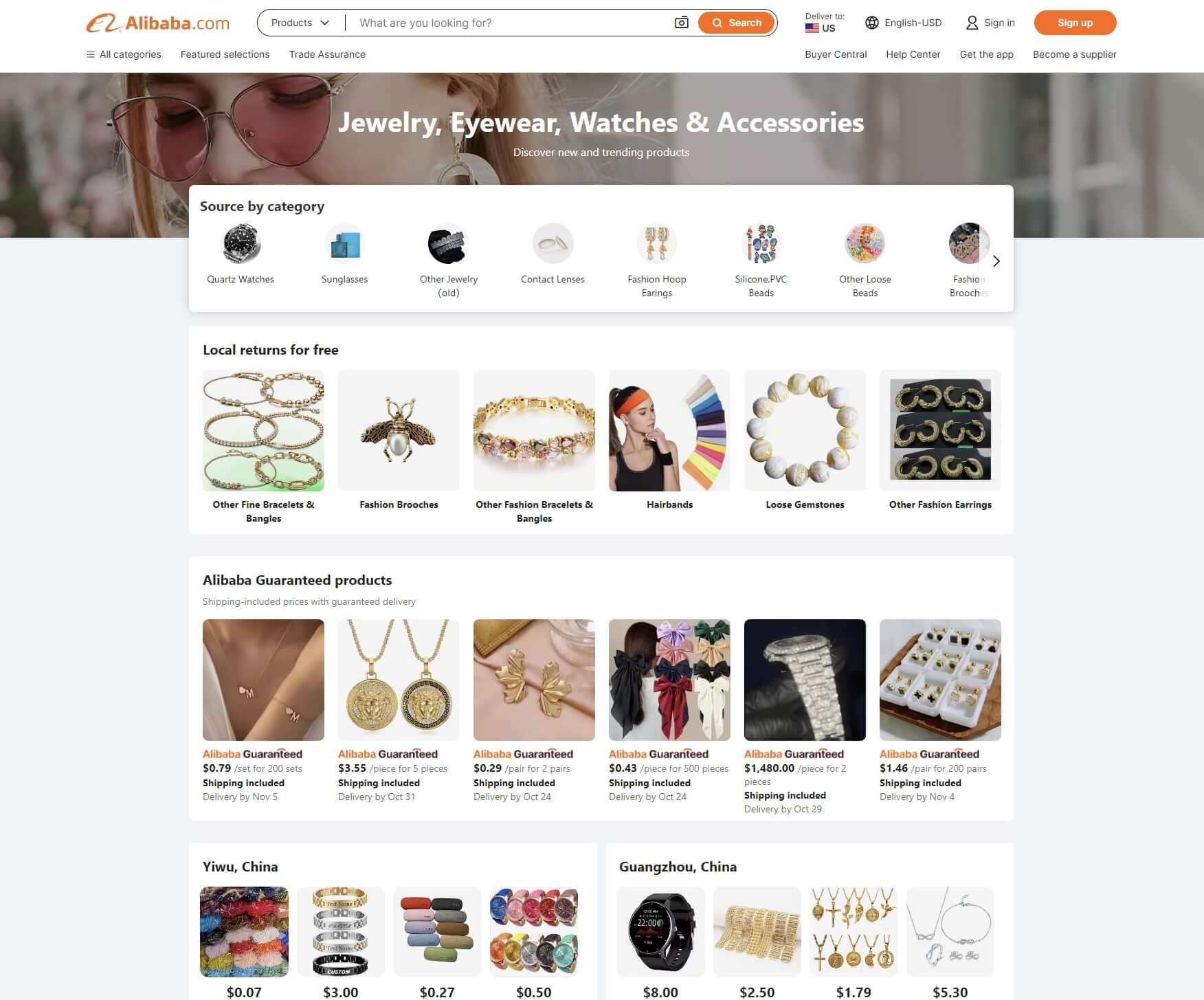
Purchasing from Alibaba can be an exciting venture into global trade. Here’s a step-by-step guide to help you navigate the process:
- Create an account on Alibaba.com. It’s free and only takes a few minutes.
- Use the search bar to find products you’re interested in. You can refine your search with filters such as price range and minimum order quantity.
- Compare different suppliers. Look at their transaction history and reviews to gauge reliability.
- Contact potential suppliers through Alibaba’s messaging system. Ask about product details, pricing, and shipping options.
- Request samples before placing a large order. This helps verify product quality.
- Negotiate terms with your chosen supplier. Discuss prices, payment methods, and delivery timelines.
- Place your order through Alibaba’s secure system. Use Trade Assurance for added protection.
- Pay for your order using Alibaba’s recommended payment methods like Alipay or bank transfer.
- Track your shipment using the provided tracking number.
- Leave feedback for your supplier after receiving and inspecting your goods.
Remember to start with smaller orders to minimize risk. As you gain experience, you can increase your order sizes.
Tools like Alibaba’s Buyer Central can provide additional support throughout your purchasing journey. It offers guides, webinars, and personalized assistance to help you make informed decisions.
1688 Vs Alibaba: Side-by-Side Comparison
When comparing 1688 and Alibaba, you’ll notice several key differences. Let’s break them down:
User Interface

The user interface plays a crucial role in determining the ease of use and overall experience on e-commerce platforms. Let’s examine how 1688 and Alibaba compare in this aspect.
1688
1688’s interface is primarily designed for the Chinese market. It offers a straightforward layout that Chinese users find familiar and easy to navigate. The platform is almost entirely in Mandarin, which can be challenging for international users.
1688 features a clean design with clear categories and product listings. A search bar at the top allows quick access to desired items. The platform effectively uses icons and images, making it visually appealing.
Despite its user-friendly nature for Chinese speakers, 1688 lacks English language support. This limitation can make it difficult for non-Chinese users to navigate and understand product details.
Alibaba
Alibaba boasts a more user-friendly interface for international users. The platform supports multiple languages, including English, making it accessible to a global audience.
You’ll appreciate Alibaba’s intuitive navigation system. It features a prominent search bar, clear category menus, and filters to refine your product search. The platform also offers detailed product pages with comprehensive information and high-quality images.
Alibaba’s interface includes additional features like live chat support and a mobile app, enhancing your user experience. These tools make it easier to communicate with suppliers and manage your sourcing activities on the go.
Payment Methods

1688 and Alibaba offer different payment options that cater to their primary markets. These differences can significantly impact your purchasing experience, especially if you’re an international buyer.
1688
1688 primarily caters to the Chinese market, which is reflected in its payment methods. You’ll find Alipay and bank transfers as the main options. If you’re an international buyer, this can present challenges.
To make purchases on 1688, you might need a Chinese credit card or a local agent to process payments. This added complexity can make transactions more difficult if you’re not familiar with Chinese payment systems.
1688’s focus on domestic transactions means you may encounter fewer international payment options. This limitation can be a significant hurdle if you’re accustomed to using global payment platforms.
Alibaba
Alibaba offers a wider range of payment methods, making it more accessible for international buyers. You can use PayPal, wire transfers, and major credit cards like American Express, MasterCard, and Visa.
This variety of options allows for greater flexibility in conducting transactions. You can choose the method that’s most convenient and cost-effective for your business.
Alibaba’s payment system also includes features to enhance security and build trust between buyers and sellers. Trade Assurance, for example, provides protection for your orders.
If you’re used to international eCommerce platforms, the payment process with Alibaba will be more straightforward and familiar. This ease of use can save you time and reduce potential complications in your transactions.
Pricing

When comparing 1688 and Alibaba, pricing is a crucial factor to consider. The two platforms have distinct pricing structures that can significantly impact your buying decisions and overall costs.
1688
1688 offers competitive prices for a wide range of products. You’ll find that prices on this platform are generally lower than on Alibaba. This is because 1688 primarily caters to the Chinese domestic market, eliminating many international trade costs.
Product costs on 1688 are typically 20-30% cheaper than on Alibaba. Shipping fees are also lower, as most transactions occur within China. You’ll benefit from transparent pricing, with accurate information provided upfront.
When using 1688, you can often negotiate prices directly with suppliers. Many sellers are willing to offer discounts, especially for bulk orders. Remember to communicate in Chinese for the best results.
Alibaba
Alibaba’s pricing structure is designed for international buyers. While product prices may be higher than on 1688, they often include additional services and protections.
You’ll encounter various fees on Alibaba, such as:
- Product costs (typically 20-30% higher than 1688)
- International shipping fees
- Customs and import taxes
- Payment processing fees
Alibaba’s prices may seem less transparent initially. This is because they often include costs for quality assurance, buyer protection, and international logistics.
When purchasing on Alibaba, you can still negotiate prices. Try proposing a “30/70 deal” to your supplier, where you pay 30% upfront and 70% after production. This can help you secure better terms and pricing.
Product Quality

Product quality varies significantly between 1688 and Alibaba. Each platform has distinct quality control measures and supplier standards that impact the products available to buyers.
1688
1688 offers a wide range of products directly from Chinese manufacturers. However, its quality control measures may not be as stringent as those on Alibaba. You’ll find a mix of high-quality items and lower-grade products.
When using 1688, it’s crucial to thoroughly vet suppliers. Request samples before placing large orders. This helps you assess product quality firsthand.
User feedback suggests that while bargains are plentiful on 1688, quality can be inconsistent. About 70% of buyers report satisfaction with product quality, but 30% express concerns about durability or finish.
Alibaba
Alibaba focuses on the international market, so suppliers must meet export standards. This often results in higher overall product quality compared to 1688.
Alibaba’s Trade Assurance program offers buyer protection, covering product quality and on-time shipment. This reduces your risk when sourcing products.
Industry experts estimate that 85% of Alibaba suppliers consistently deliver products meeting international quality standards. However, it’s still wise to order samples and conduct due diligence.
You’ll find a higher percentage of Gold Suppliers on Alibaba. These vendors have undergone verification processes, potentially leading to more reliable product quality.
Language

Language options and support significantly impact the usability of e-commerce platforms for international buyers. The differences between 1688 and Alibaba in this aspect can be crucial for your sourcing decisions.
1688
1688’s website is primarily in Chinese, which can pose a challenge for non-Chinese speakers. You’ll find limited English support, making navigation and communication with suppliers difficult.
To use 1688 effectively, you may need to:
- Use browser translation tools
- Hire a translator or Chinese-speaking assistant
- Learn basic Chinese phrases for sourcing
Despite these hurdles, some buyers find 1688’s lower prices worth the extra effort. However, miscommunication risks are higher due to language barriers.
User reviews often mention struggles with understanding product descriptions and negotiating terms on 1688.
Alibaba
Alibaba offers support for 16 languages, including English, making it more accessible to international buyers. You’ll find:
- Multi-language website interface
- English-speaking customer support
- Suppliers often have English-speaking staff
Alibaba provides built-in translation tools for messaging, helping you communicate with suppliers more easily. This reduces misunderstandings and improves your sourcing efficiency.
Many users praise Alibaba’s language accessibility, noting it as a key advantage over 1688 for non-Chinese speakers. Expert opinions often recommend Alibaba for first-time international buyers due to its user-friendly language options.
1688 vs Alibaba FAQs
When comparing 1688 and Alibaba, several key questions arise about their suitability for different business needs, safety considerations, and buyer protection options. Let’s address these common inquiries to help you make an informed decision for your sourcing strategy.
Is 1688 or Alibaba Better?
The choice between 1688 and Alibaba depends on your specific requirements.
1688 is generally better for smaller orders with lower minimum order quantities (MOQs), making it ideal for small and medium-sized businesses.
Alibaba, on the other hand, caters more to international buyers looking for larger quantities.
If you’re targeting the Chinese market, 1688 might be more suitable as it primarily serves domestic buyers within China. Alibaba offers a wider range of products and is designed for global trade.
Is It Safe to Buy from 1688?
Yes, it can be safe to buy from 1688 if you take proper precautions. To ensure a secure transaction, always verify suppliers thoroughly. Check their business licenses and certifications.
Use secure payment methods provided by the platform. It’s also wise to request samples before placing large orders to verify product quality.
Remember that 1688 is primarily in Chinese, so you may need translation tools or assistance to navigate the platform effectively.
Does 1688 Also Provide a Similar Option to Alibaba Trade Assurance?
1688 doesn’t offer an identical Trade Assurance program like Alibaba. However, it does provide some buyer protection measures. These include secure payment options and dispute resolution services.
For more comprehensive protection, you might consider using Alibaba for international transactions. Alibaba’s Trade Assurance offers additional safeguards for order quality and on-time shipping.
1688 vs Alibaba: Which Is Best for Your China Sourcing?
Your choice between 1688 and Alibaba should align with your specific sourcing needs. 1688 is often preferred for smaller orders and domestic Chinese transactions. It’s particularly useful if you’re looking for lower MOQs or sourcing products for dropshipping.
Alibaba is better suited for international buyers seeking larger quantities. It offers more comprehensive services, including Trade Assurance and a wider range of payment options.
Consider factors like order size, target market, and language preferences. If you’re comfortable with Chinese or have a local partner, 1688 could offer cost advantages. For a more user-friendly international experience, Alibaba might be the better choice.
Final Thoughts: Deciding between 1688 vs Alibaba
1688 and Alibaba are powerful platforms for sourcing products from Chinese suppliers. Both offer unique advantages for different business needs.
Alibaba caters to global buyers with its English interface and international shipping options. It’s ideal if you’re new to dropshipping or sourcing from China.
1688 provides access to lower prices and a wider range of products. However, it requires Chinese language skills and familiarity with local business practices.
Your choice depends on your specific requirements. Consider factors like language proficiency, budget constraints, and target market.
Remember, successful sourcing goes beyond platform selection. It involves careful supplier vetting and quality control.
Ready to start your sourcing journey? Request a personalized sourcing quote to find the best products for your business.
Our expert assistance at NicheDropshipping can streamline your process and boost your chances of success in the competitive world of e-commerce.
